

Making the Case for Social Media in Schools. "Do you have a Twitter account?
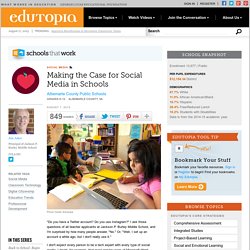
Do you use Instagram? " I ask those questions of all teacher applicants at Jackson P. Burley Middle School, and I'm surprised by how many people answer, "No. " Or, "Well, I set up an account a while ago, but I don't really use it. " I don't expect every person to be a tech expert with every type of social media. When I started at Burley four years ago, the school had a Twitter account for informational purposes, and few teachers had accounts. Carol Dweck: The power of believing that you can improve.
Helping Your Child Build a Strong Vocabulary. To succeed in school and beyond, children need to build a robust vocabulary.
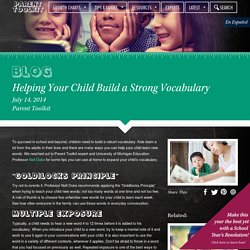
Kids learn a lot from the adults in their lives and there are many ways you can help your child learn new words. We reached out to Parent Toolkit expert and University of Michigan Education Professor Nell Duke for some tips you can use at home to expand your child’s vocabulary. “Goldilocks Principle” Try not to overdo it. Professor Nell Duke recommends applying the “Goldilocks Principle” when trying to teach your child new words: not too many words at one time and not too few. Multiple Exposure. The impact of mindset on student aggression and behavior - Growth Mindset Blog & Newsletter. My former student David Yeager and I have been very concerned about violence in school.
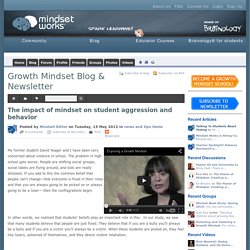
The problem in high school gets worse. People are shifting social groups; social labels are flying around, and kids are really stressed. If you add to this the common belief that people can’t change—that everyone is fixed in their roles and that you are always going to be picked on or always going to be a loser— then the conflagrations begin. In other words, we realized that students’ beliefs play an important role in this. In our study, we saw that many students believe that people are just fixed. Changing the world of Autism. Birmingham Grid for Learning - Multiple Intelligences (Secondary) Why it is important to build a large vocabulary and how eSpindle helps via vocabulary tutoring. ”Why do large vocabularies characterize executives and possibly outstanding men and women in their fields?”
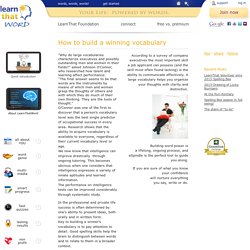
Asked Johnson O’Connor, who researched how talent and learning affect performance. ”The final answer seems to be that words are the instruments by means of which men and women grasp the thoughts of others and with which they do much of their own thinking. They are the tools of thought.” Welcome to Forbes. Want to Stop Mean Girls? Raise Nice Girls, Instead Once upon a time, fourth grade was the year that young girls began to have difficulty navigating friendships.

For many years, I worked in a school for kids with learning disabilities. Watch What's Working: Carol Dweck Talks Growth Mindset. What about the kids that don't "get" school?
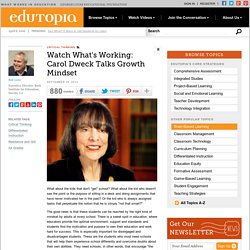
What about the kid who doesn't see the point or the purpose of sitting in a desk and doing assignments that have never motivated her in the past? Or the kid who is always assigned tasks that perpetuate the notion that he is simply "not that smart? " Thiel: Ask more questions before enrolling in college. Billionaire venture capitalist and serial entrepreneur Peter Thiel says high school seniors need to take a long look before they leap into college.
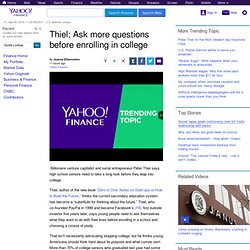
Thiel, author of the new book “Zero to One: Notes on Start-ups or How to Build the Future,” thinks the current secondary education system has become a “substitute for thinking about the future.” What Do All Babies Need Yet Aren't Getting Equally? To break the cycle of poverty, young children need something that’s as free and abundant as air.
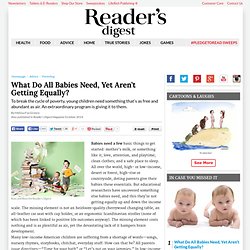
An extraordinary program is giving it to them. Russ and Reyn for Reader’s Digest Babies need a few basic things to get started: mother’s milk, or something like it; love, attention, and playtime; clean clothes; and a safe place to sleep. All over the world, high- or low-income, desert or forest, high-rise or countryside, doting parents give their babies these essentials. But educational researchers have uncovered something else babies need, and this they’re not getting equally up and down the income scale. Many low-income American children are suffering from a shortage of words—songs, nursery rhymes, storybooks, chitchat, everyday stuff. In many low-income families, warm and loving parents may struggle desperately to provide all the other basics, without a clue that their relative silence—and the lack of bedtime stories, picture books, and lullabies—hurts the babies.
Giving Good Praise to Girls: What Messages Stick. How to praise kids: It’s a hot topic for many parents and educators.
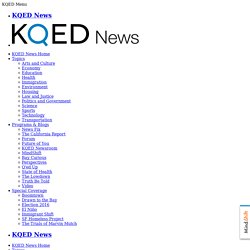
A lot of the conversation around it has stemmed from studies by Carol Dweck, professor of psychology at Stanford who has been researching this specific topic for many years. “My research shows that praise for intelligence or ability backfires,” said Dweck, who co-authored a seminal research paper on the effects of praise on motivation and performance. “What we’ve shown is that when you praise someone, say, ‘You’re smart at this,’ the next time they struggle, they think they’re not. It’s really about praising the process they engage in, not how smart they are or how good they are at it, but taking on difficulty, trying many different strategies, sticking to it and achieving over time.”
Top 3 Reasons to Improve Your Vocabulary - Litemind. Developing a great vocabulary is one of the most overlooked ways to improve our lives.

It is often believed that learning many words is only useful for writers and speakers, but the truth is that everyone benefits from it, both personally and professionally. Vocabulary Sharpens Your Communication. Wire Side Chats: How Can Teachers Develop Students' Motivation. What can teachers do to help develop students who will face challenges rather than be overwhelmed by them? Why is it that many students seem to fall apart when they get to junior high or middle school? Can the "gifted" label do more harm than good?
Do early lessons set girls up for failure? Is self-esteem something that teachers can or should "give" to students? Those are some of the questions Carol Dweck, professor of psychology at Columbia University, answers for Education World. Carol S. Dweck shares with Education World readers some of her thoughts about the role of motivation in learning. Big Thinkers: Howard Gardner on Multiple Intelligences. Howard Gardner: We have schools because we hope that someday when children have left schools that they will still be able to use what it is that they've learned. And there is now a massive amount of evidence from all realms of science that unless individuals take a very active role in what it is that they're studying, unless they learn to ask questions, to do things hands-on, to essentially recreate things in their own mind and then transform them as is needed, the ideas just disappear.
The student may have a good grade on the exam. We may think that he or she is learning, but a year or two later there's nothing left. The idea of multiple intelligences comes out of psychology. Gardner's Multiple Intelligences. Howard Gardner of Harvard has identified seven distinct intelligences.
This theory has emerged from recent cognitive research and "documents the extent to which students possess different kinds of minds and therefore learn, remember, perform, and understand in different ways," according to Gardner (1991). According to this theory, "we are all able to know the world through language, logical-mathematical analysis, spatial representation, musical thinking, the use of the body to solve problems or to make things, an understanding of other individuals, and an understanding of ourselves. Howard Gardner, multiple intelligences and education. Howard Gardner, multiple intelligences and education. Howard Gardner’s work around multiple intelligences has had a profound impact on thinking and practice in education – especially in the United States.
MindSet: A Book written by Carol Dweck. Teaching a growth mindset creates motivation and productivity in the worlds of business, education, and sports. Signe Whitson: Rude vs. Mean vs. Bullying: Defining the Differences. A few weeks ago, I had the terrific fortune of getting to present some of the bullying prevention work that I do to a group of children at a local bookstore. As if interacting with smiling, exuberant young people was not gift enough, a reporter also attended the event a wrote a lovely article about my book and the work I do with kids, parents, educators and youth care professionals.
All in all, it was dream publicity and since then, has sparked many conversations with people in my town who saw my photo in the newspaper and immediately related to the examples of bullying that were discussed. I have been brought to tears more than once since the article ran, while listening to parents share their feelings of outrage and helplessness over their kids’ experiences with bullying in school. One gifted but socially awkward middle school student blew me away with his articulate, poised, yet searingly painful accounts of relentless physical and verbal bullying on his school bus. Explore HuffPost. Carol Dweck on the power of "Yet" Carol Dweck: Discovering the Importance of Mindset. Carol Dweck: The Effect of Praise on Mindsets. Educational Leadership:Early Intervention at Every Age:The Perils and Promise... Want to keep your new middle-schooler out of trouble? Then let them take risks.